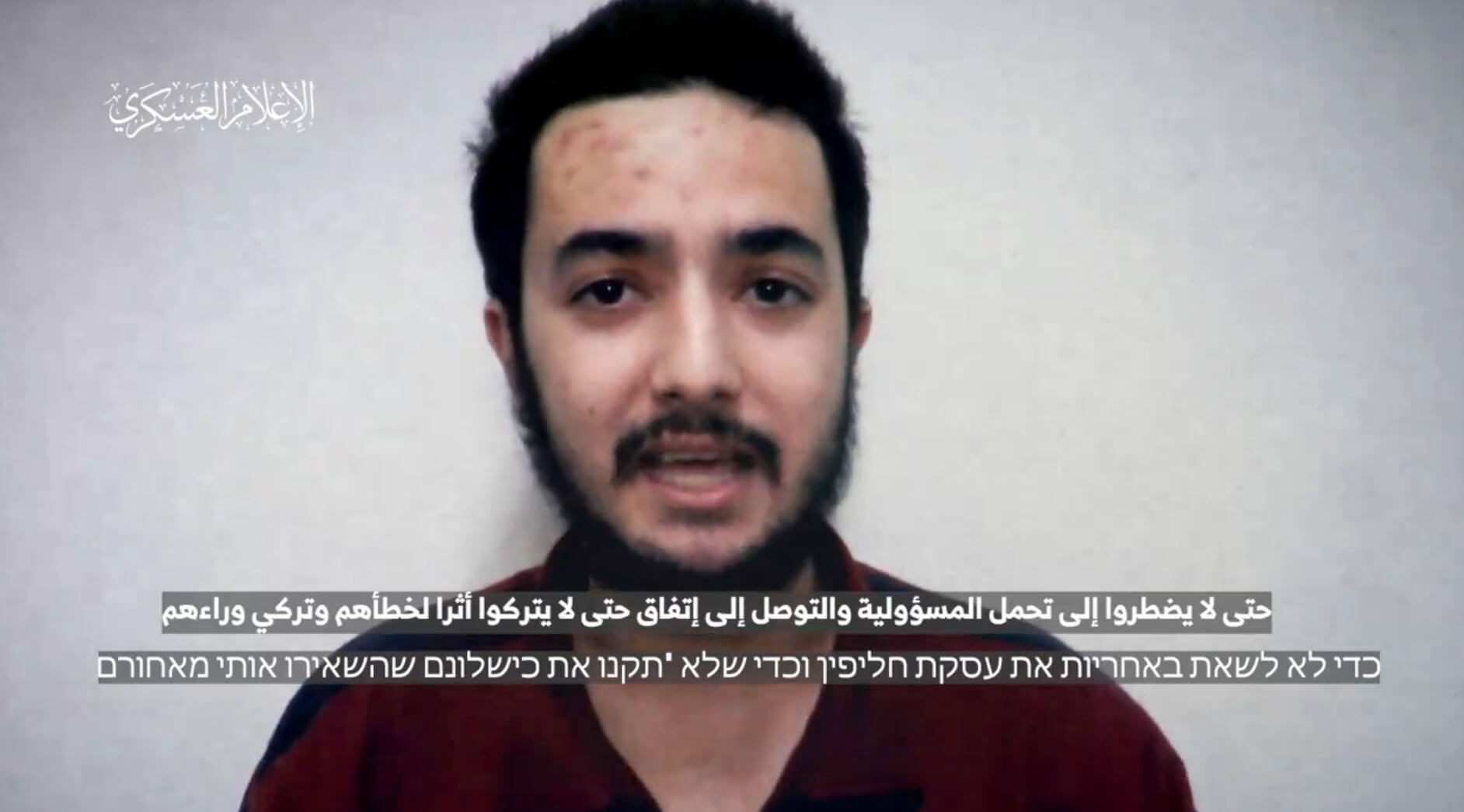Hersh Goldberg-Polin’s last words are not just Hamas propaganda
The hostage videos released this week were made by their killers. The victims’ families still want you to see them.

Hersh Goldberg-Polin in a propaganda video released by Hamas Sept. 5, days after IDF troops discovered him and five other hostages murdered in Gaza. Image by screenshot
In a new video released by Hamas on Thursday, Hersh Goldberg-Polin, the most famous of the six murdered hostages Israel discovered last weekend, implores American leaders to bring the war in Gaza to an end.
“My own country, Israel, has been trying to bomb me, nonstop,” says Goldberg-Polin, “so they don’t have to take responsibility and make a deal for their mistake and for leaving me behind.”
He is seated against a gray wall, seemingly reading from a script. The shot cuts to close-up as his words replay, with an echo added for sinister effect.
It’s the fourth clip posted this week by Hamas, the Palestinian terror group that led the Oct. 7 terror attack in which some 250 hostages were abducted from Israel. The other three clips show Eden Yerushalmi, Carmel Gat and Ori Danino, three other hostages found shot to death along with Goldberg-Polin inside a tunnel in Rafah. They look and sound similar, including heartfelt messages to each captives’ family, and they all end with the same threat: These prisoners will die unless Israel stops the war.
In a video just released by Hamas, slain Israeli-American hostage Hersh Goldberg-Polin said:
— Jacob N. Kornbluh (@jacobkornbluh) September 5, 2024
"I'm asking you, Mr. President Joe Biden and Anthony Blinken and all my fellow American citizens, to do everything you can to stop the war, stop this madness and to bring me home now." pic.twitter.com/IZNZwTnHNM
These are, plainly, Hamas propaganda videos. The statements, however representative of each hostage’s actual opinion, are coerced. Their editing and the timing of their release are intended, by their captors, to maximize emotional impact.
But because of what they say, because of when we are watching them, and because Goldberg-Polin’s parents and other hostage relatives have blessed news outlets like ours in sharing them, they are also more than just propaganda. Coming, collectively, as a prophecy already fulfilled, they have been deployed as an indictment of Prime Minister Benjamin Netanyahu, who in recent days has faced the broadest Israeli protests since the war began 11 months ago.
“You are trying to kill us one after another in failed rescue attempts,” Danino, a soldier who was off-duty when he was kidnapped from the Nova festival, practically barks at Netanyahu in his video. “At this rate, none of us will survive.”
Gat, who was 40 and taken from her parents’ home on Kibbutz Be’eri, presses her palms together and begs the prime minister to cease the bombing. Yerushalmi’s video — at 12 seconds, the shortest of the bunch — does not address the war. But surfacing after her death, it almost doesn’t need to.
Because while Hamas has periodically posted hostage videos to Telegram since the early weeks of their captivity, the four from this week are the first they have released posthumously. That gives the clips a unique political power, and not just for Hamas. For the terrorists are not the only people who want you to see these videos.
“This must serve as an immediate wake-up call to the world to take action today to secure the release of the remaining 101 hostages before it is too late,” Goldberg-Polin’s parents, Jon and Rachel, said in a statement approving publication of the video. “No other family should go through what our family (and the families of the other recently executed hostages) have endured.”
Since Oct. 7, the families of the hostages, and Rachel Goldberg-Polin in particular, have been the public faces of the Israeli movement demanding a ceasefire and prisoner exchange. Those calls have grown louder since the murders of the Rafah six. The mother of Almog Sarusi said at his funeral that he had been “abandoned on the altar of destroying Hamas.” Tens of thousands of Israelis have amplified their grief and outrage in the streets.
Hamas can see as easily as we do the mounting pressure on Netanyahu, who called separate Hebrew and English news conferences this week to defend his hard-line position in ceasefire talks. While their goals are polar opposites — Hamas wants to destroy Israel and the hostage families want to live in peace — they may see the immediate next steps toward those goals as the same: a deal that would stop the fighting and release the remaining 95 captives, 60 of whom are believed to be alive.
The White House and some American and Israeli analysts say that Netanyahu is a major obstacle to such a deal. The latest sticking point seems to be the prime minister’s insistence on retaining Israeli troops in the Philadelphi Corridor, a buffer zone along Gaza’s southern border with Egypt. Israeli officials have said the six hostages were murdered around the time Netanyahu’s cabinet voted last week not to yield on the Philadelphi demand.
The New York Times reported that Philadelphi only became a red line for the prime minister in July — seemingly after the Gat video was shot. In it, she says she is 39 years old; her 40th birthday was in May.
While the #BringThemHomeNOW rallying cry has been ubiquitous in the Jewish world since Oct. 7, it has different meanings to different groups. Some see it as imperative to pursue total victory; others as reason to negotiate with the enemy.
It’s unlikely that these videos change anyone’s mind. But one thing about them — the most awful thing about them — is indisputable: They are the last glimpses of beloved relatives, who feel like that to millions more.
















